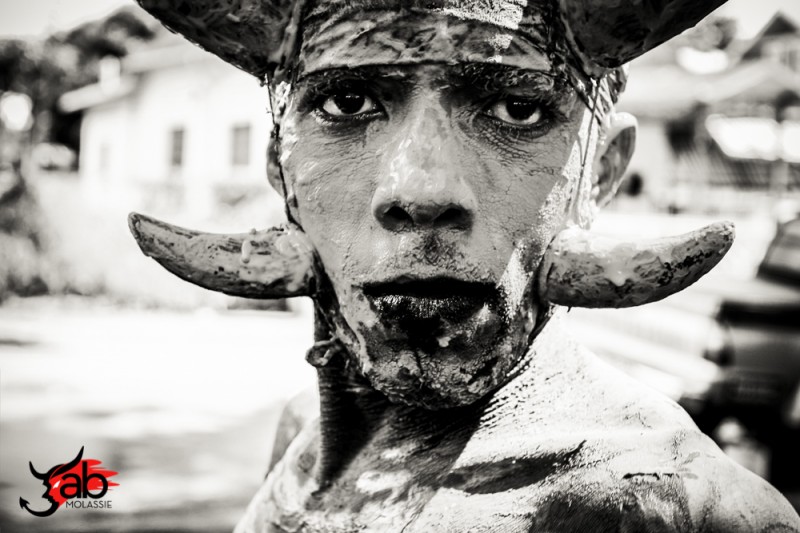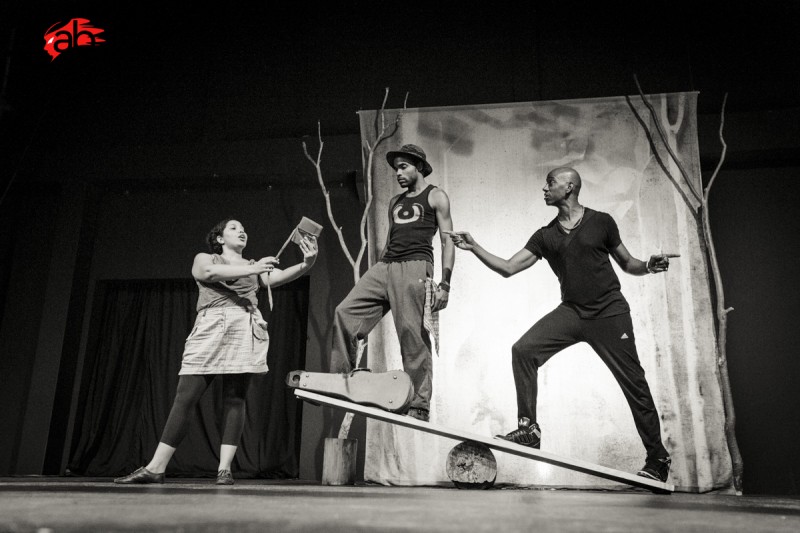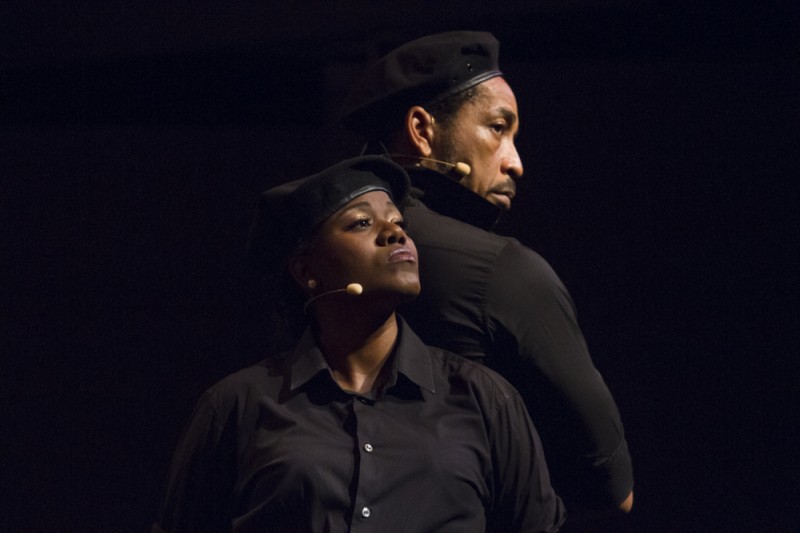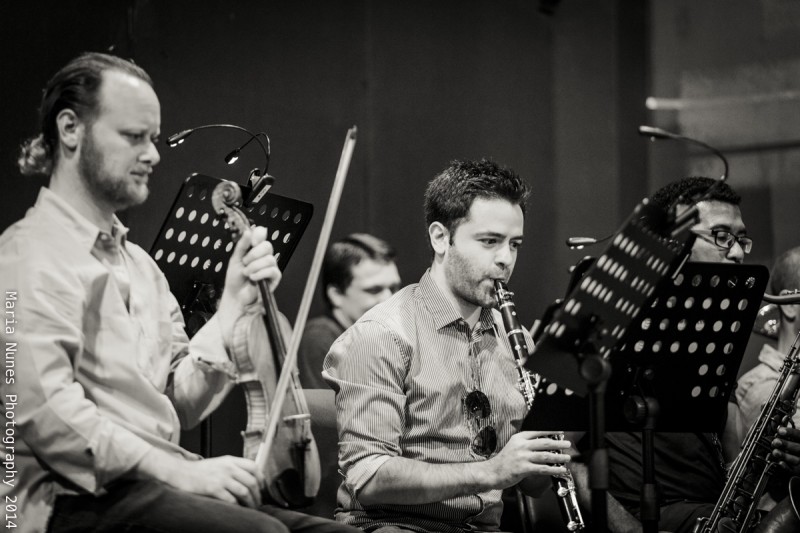 [1]
[1]Promotional photo for the new indigenous music-theatre work, Jab Molassie, premiering in Trinidad and Tobago this week. Photo by Maria Nunes, courtesy the Calabash Foundation for the Arts, used with permission.
Picture this: Laventille [2] — one of the most creative, yet most underprivileged areas of Trinidad. Jab Molassie [3], the Devil in disguise, tricks struggling musician Starboy, convincing him that he can realize his wildest dreams by trading his instrument for a magical book. Jab will teach Starboy how to use the book, if Starboy will teach Jab how to play the violin. The deal is made, but Starboy discovers, after too much time has passed, that he is rich but miserable. He misses his old life, but most of all, he misses his music. Left with nothing of real value, he plays against the Devil in a game of All Fours [4] to win back his freedom. But will Starboy ever really break free from Jab Molassie?
If the plot of Trinidad and Tobago's newest indigenous piece of music-theatre sounds familiar, it may be because it's an adaptation of Igor Stravinsky's The Soldier's Tale [5]. Caitlyn Kamminga [6], a native of New Orleans who is currently an assistant professor of Double Bass at the University of Trinidad and Tobago's Academy for Performing Arts, wrote the libretto and collaborated with Trinidad-born, London-based composer Dominique Le Gendre [7] to bring the concept to the stage. The Jab Molassie [1] world premiere will take place this Thursday at The Little Carib Theatre [8] in Port of Spain, which was founded by the legendary Trinidadian dancer Beryl McBurnie [9] and has long been a home for the expression and development of indigenous culture. Global Voices sat down with some of the main players to find out more about the production.
Global Voices (GV): Explain what Jab Molassie is and why it is important to Trinidad and Tobago.
Dominique Le Gendre (DLG): Jab Molassie is a translation into Trinidadian culture of Stravinsky's “The Soldier's Tale”, [which] shows the universality of the original story. It is a timely cautionary tale that alerts the audience to the relaxed presence of temptation in all of its forms and the dire consequences of succumbing. It also reminds us that while we make mistakes in life, redemption requires effort if we are to hold on to the most essential part of ourselves: our integrity.
What is original about this work is the way in which it brings together characters, locations and elements of Trinidad's present with its past through the use of carnival [10], music design and lighting, all the while remaining a piece that is thoroughly of its time.

Natalia Dopwell and Roger Roberts playing the role of the Jab Molassies; Nickolai Salcedo as Starboy is between them. Photo by Maria Nunes, used with permission.
GV: Caitlyn, what inspired you to write the libretto? As a non-Trinidadian, how were you able to capture the spirit and culture of the place authentically?
Caitlyn Kamminga (CK): When we [Caitlyn and her husband, British trombonist Aidan Chamberlain [11]] arrived in Trinidad in 2009, the National Academy for the Performing Arts [12] had not yet been built. Amongst other things, we had been brought over to help create the programs for a newly-forming Academy for the Performing Arts. My colleagues and I hit the ground running, networking in the community. A big part of our ongoing research is creating a relevant concert series that opens the doors of NAPA to the public, offering a professional model to our students.
Stravinsky, at the time of writing L'Histoire [13], was heavily influenced by the in vogue ‘primitivism’ and African rhythms that Europeans were hearing for the first time. I really wanted to perform the work in Trinidad and Tobago, as I thought it would go down very well. It was my husband who suggested a local adaptation to make the work more accessible to Trinbagonian audiences. Once I started doing research […] I became completely immersed in the poetry of the language. I had a wonderful partner in the process, the original Corporal [a character in the play] , who was a security guard at my children's school. He was from Belmont [14] and […] frankly, he would take the piss out of my choices of language: ‘Miss Caitlyn, they might say that in New Orleans…but a Trini would never say that!’ He was a wonderful man. Sadly, I have lost touch with him. But I am eternally grateful for his input, for the time and care that he took in helping me.

Germaine Wilson and Wendell Manwarren in the role of the Corporals. Photo by Maria Nunes, used with permission.
GV: How did Dominique get involved?
CK: Dominique and I already had a professional relationship, as she had written a piece for my group Ibis Ensemble [15], Fragments 1 [16], which drew from Derek Walcott's Nobel speech [17]. When the plan to perform the new libretto with the original score by Stravinsky fell through, I decided to approach Dominique about the possibility of commissioning new music. I loved her music and as the idea grew and formed, I realized how the creation of an entirely new work would make a much greater impact. Dom has been so delightfully creative and supportive through the process.
GV: Dominique, walk us through your composition process for Jab — what were you trying to capture through the music?
DLG: Throughout the composition I wanted to evoke the music that I grew up with: a combination of classical music, the music of and in Trinidad from the 1930s-70s, the music of Martinique and Venezuela from the same era and to use all of these sounds to capture the spirit of the characters with all of their dynamism, invention, humour, trickster-ness, compassion, envy, desire, strengths and weaknesses. The process itself was a slow one, ensuring that the music was fully expressing each character in their truth or untruth, while also maintaining an outside eye. In a way, it's difficult to explain the process of writing because once the characters and the setting are in my head, the sound appears and I simply have to follow that sound while asking myself the questions that need to be asked to ensure that what I am writing works as a coherent whole.

Some of the musicians performing in Jab Molassie. Photo by Maria Nunes, used with permission.
GV: How was the University of Trinidad and Tobago involved and why was it important to Calabash Foundation for the Arts [18], which helped develop the work, to have students be part of the process?
CK: My work at the UTT as an Assistant Professor in the music department and as a teaching artist requires creating constant circles from the student body out into the community and bringing the community back into the Academy for the Performing Arts. The Campus Concert Series [19] was designed first and foremost as a professional model for our students. Both of the workshops [20] and the premiere [21] have been wonderful opportunities for students to work in a professional environment. Thanks to Calabash's fundraising efforts and their belief in the educational benefits of working alongside the amazing cast, the students signed professional contracts and were paid stipends in return for their commitment.
Look out for the second installment of this story, when we'll discuss the ways in which Jab Molassie has benefitted from international collaboration, the challenges of getting from idea to stage, and the future plans for the production.